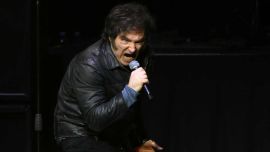Gabriel Nicosia remembers walking with his mother 40 years ago in front of the stadium complex of San Lorenzo football club, which he still frequents today to exercise and chat with the locals.
But he fears that community life at the club will disappear if the institution is sold off to a private company, as President Javier Milei hopes.
The ongoing debate over the incorporation of private sporting corporations or limited companies (SAD, in their Spanish acronym) into domestic football has sparked clashes between the government and clubs, whose leaders and members tend to oppose the idea.
“I remember holding hands with my old lady [mother] and going through the club, walking underneath the stands, all made of wood,” recalled Nicosia, who has been a San Lorenzo fan “forever.”
Gabriel is a regular at the club’s headquarters in the Boedo neighbourhood of Buenos Aires. In the gym’s weights room, the 50-year-old accountant greets other members who, like him, regularly play football, basketball or plan a kermesse. Closely children practise dancing, swimming or martial arts. Many parents wait in the cafeteria, which is decorated with flags evoking international titles and players of the national football team.
But if this club, of which Pope Francis is also a fan, becomes a privately-owned company, “many things could change and social values could be lost,” Nicosia warned.
In Argentina, the teams that compete in professional football’s top flight are non-profit civil associations controlled by the members, who pay a monthly fee and have voting rights.
They provide social “containment and possibilities,” such as offering 300 scholarships for young people from the neighbouring slum to enjoy the swimming pool, San Lorenzo Club Director Martin Cigna said in an interview.
The kids from the neighbourhood practise just a stone’s throw from where the professional football team’s players, several of them millionaires, train.
Unlike other countries in the region, such as Brazil, where clubs are less closely linked to local communities, in Argentina these small entities, such as the humble Parque in Buenos Aires, often provide youth players who will later become star footballers for top teams.
The neighbourhood club worked with Argentinos Juniors, where Diego Maradona made his debut, and trained other world champions such as Sergio Batista and Alexis MacAllister, or international stars such as former Manchester United and Manchester City player Carlos Tevez.
Old debate
In its statutes, the Argentine Football Association (AFA) does not allow a sports club under another legal form, such as a SAD, to compete in its league competitions.
Establishing SADs would put non-professional football activities at risk, because “anything that doesn’t make a profit is going to be closed down – that’s the commercial logic,” said Verónica Moreira, a specialist in social studies of sport.
The discussion gained momentum before last year’s elections, which consecrated Milei as Argentina’s President.
“Who the fuck cares who the owner is if you win ... five-nil and become world champion? Or do you prefer to continue in this misery that we have, with football of increasingly poorer quality?” he said in a television appearance.
Through two decrees, the Milei government tried to force AFA to accept the entry of SADs into its structure – a move which was repudiated by the football community and has been halted by the courts.
“It’s not for our model of football,” responded AFA president Claudio ‘Chiqui’ Tapia, under whose management Argentina won the World Cup in Qatar 2022 and the Copa América twice, in 2021 and 2024.
According to Moreira, “in civil associations, what is earned is reinvested in the club” while a private company “invests the money, then wants to take the profit.”
But those who defend SADs do not see it that way.
“This is [a move] in favour of the clubs. We are convinced that this could be the way forward,” said Tourism & Sports Secretary Daniel Scioli.
“Wouldn’t it be good if the facilities could be improved?” asked the veteran Peronist, who now serves in the Milei administration.
Before Milei there have been previous attempts to allow private capital into the game: in the late 1990s and during the 2015-2019 government of former president Mauricio Macri.
Deficit-ridden
Some club leaders are open to the entry of private capital, such as ex-Manchester United star Juan Sebastian Veron, the president of century-old side Estudiantes de la Plata.
He is preparing “for another type of opening” in Argentina.
But most are opposed, such as Cigna, who explained that San Lorenzo, in addition to sports, also provides social assistance for the purchase of glasses or insoles for those with foot problems.
“This year we are going to end up with a deficit of around one million dollars and that is covered by the rest of the club’s income, mostly from professional football. Social fees are not enough,” he said.
On the other side of the Matanza-Riachuelo river that divides Buenos Aires from the province of the same name lies Lanús, a competitive club which hosts more than 30 sports and artistic disciplines. It also welcomes primary and secondary schools through its doors.
The club, which has more than 25,000 members, is involved in activities that “would be loss-making” without the money made from football, explained club president Luis Chebel.
He is also against the incorporation of SADs into local football. The funds needed to maintain the current dynamic, he said, “would be taken by those who put up the money” to buy the club.
Privately owned clubs – a model up for debate
Argentina is playing an important game – between the government, which is pushing for private capital to enter local football, and local sports clubs, which reject the idea.
The latter argue that allowing private capital and owners into the national game would threaten the good work they do in the community. But the model is already a reality in other Latin American countries, including Mexico and neighbours Brazil and Uruguay.
President Javier Milei has issued two decrees seeking to pressure the Argentine Football Association (AFA) into agreeing the entry of private sporting corporations or limited companies (SAD, in their Spanish acronym) into the domestic game, but both have been blocked by the courts.
Proponents say the clubs would benefit from the influx of private capital, but opponents argue that investors will only seek to take the money out of football, defunding other activities that are dependent on the income.
While Milei says this would allow Argentina to have a “much, much better quality” domestic league, AFA President Claudio Tapia says this is “not the model” of football that led the country to its recent Copa América triumphs ( in 2021 and 2024) and World Cup glory in Qatar in 2022.
In neighbouring Brazil, the private model is allowed. Clubs are called Sociedades Anónimas del Fútbol (SAF) after a 2021 reform approved by Congress that facilitated the rescue of institutions in financial troubles or to boost the accounts of those in order.
But in the land of ‘jogo bonito,’ clubs do not have a close link with the neighbourhoods from which they emerged or operate. Most members do not have political rights, with that honour reserved for those who can pay an expensive fee and have access to a “title” that ultimately gives them the right to vote.
Since the introduction of the SAF model, some teams are still struggling financially and have seen no sporting improvements.
Others have, such as Botafogo who, in November 2024, lead the Brazilian league and are now finalists in the Copa Libertadores.
In neighbouring Uruguay, clubs have been allowed to compete in the national league as a public limited company since 2001. Deportivo Maldonado, based close to the famous seaside resort of Punta del Este, became the first SAD registered with the Uruguayan Football Association (AUF) in 2009.
The century-old club from the city of Maldonado, some 130 kilometres from Montevideo, was promoted to the top flight in 2019 and last year qualified for the second round of the Copa Libertadores in 2023.
Neighbouring San Carlos is home to Atenas, which was taken over by a joint-stock company that placed former Uruguayan national team striker and ex-Manchester United star Diego Forlán in charge of the club.
Forlán lasted half a year and left Atenas embroiled in a fight with the investment group that owned it. After two years of unsuccessful attempts at promotion, the company left the club, which is now looking for investors to help it stay afloat.
To the north, in Mexico, most teams are owned by private entrepreneurs or groups of investors. Since 2024, América and Estadio Azteca have been listed on the Mexican stock exchange like any other company.
related news
by Martín Raschinsky, AFP


























Comments